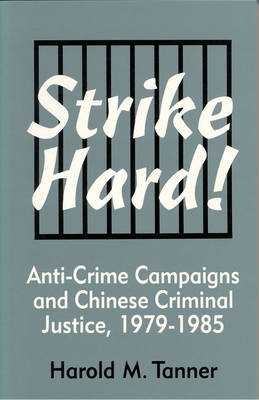
- Afhalen na 1 uur in een winkel met voorraad
- Gratis thuislevering in België vanaf € 30
- Ruim aanbod met 7 miljoen producten
- Afhalen na 1 uur in een winkel met voorraad
- Gratis thuislevering in België vanaf € 30
- Ruim aanbod met 7 miljoen producten
Zoeken
Strike Hard! Anti-Crime Campaigns and Chinese Criminal Justice, 1979-1985
Harold M Tanner
€ 67,95
+ 135 punten
Omschrijving
As it set forth to achieve rapid modernizing economic growth under the leadership of Deng Xiaoping, the People's Republic simultaneously undertook to reform China's criminal justice system in order to make it more efficient, more accountable to central authority, and better suited to the task of maintaining public order in a changing economic and social environment. Taking a historical approach, this book draws on a wide variety of openly and internally published laws, legal interpretations, talks, speeches, Communist Party documents, collections of criminal cases and other sources ranging from the 1950s to the 1990s in order to portray the development of the Chinese criminal justice system between 1979 and 1985 and to place these changes in the context of the reform agenda of Deng's China. Particular attention is paid to the practice of criminal justice and the reform of prisoners, to the role of campaigns in the development of the Chinese criminal justice system, and to the relationship between crime trends, criminal justice, and modernization.
Specificaties
Betrokkenen
- Auteur(s):
- Uitgeverij:
Inhoud
- Aantal bladzijden:
- 270
- Taal:
- Engels
- Reeks:
Eigenschappen
- Productcode (EAN):
- 9781885445643
- Verschijningsdatum:
- 31/03/2010
- Uitvoering:
- Hardcover
- Formaat:
- Genaaid
- Afmetingen:
- 151 mm x 221 mm
- Gewicht:
- 458 g

Alleen bij Standaard Boekhandel
+ 135 punten op je klantenkaart van Standaard Boekhandel
Beoordelingen
We publiceren alleen reviews die voldoen aan de voorwaarden voor reviews. Bekijk onze voorwaarden voor reviews.











